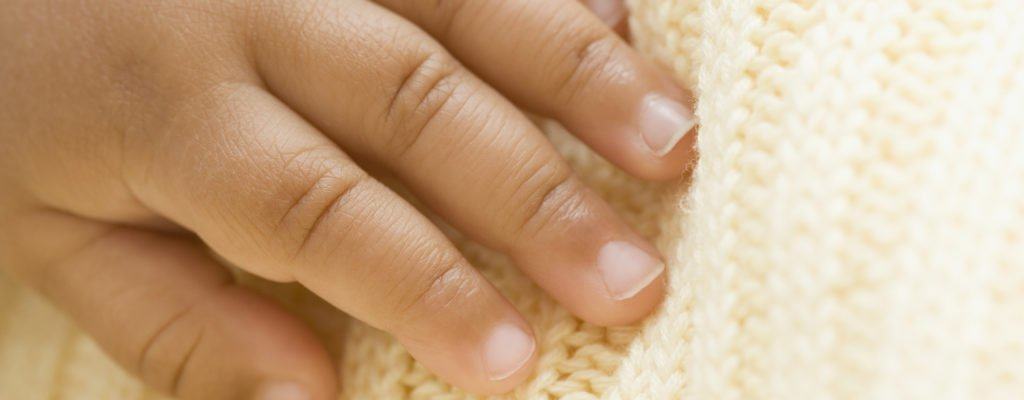Ways to determine an infants caloric needs

Learn how to determine your baby’s caloric needs, including the calories in breast milk and formula, to ensure your infant gets the right nutrition for healthy growth.

Nail and pedicure diseases are very common in young children. Almost children have been hit by their nails on something. These types of injuries can be quite painful but are usually not serious. Parents can often help their children relieve pain and prevent infection at home.
Usually, nails grow about a tenth of a millimeter each day. Toenails grow at about half or a third of the speed of the nail. Aging or getting sick can slow the blood flow to the hands and feet and slow nail growth.
Here are some common nail changes in children including:
Nails are cracked, peeled, or brittle
This is very common when a child's hands are constantly in contact with water, strong soap and other chemicals. You can help prevent this problem by applying lotion and avoiding repeated contact with water.
Changes in color on nails
A small white stain (leukonychia) on the nail usually appears after a minor injury. It can last for weeks or months and usually goes away on its own;
The nail turns black after an injury. The black or purple-black color is caused by a hematoma under the nail and disappears upon wound healing;
Black, brown, or purple under the fingernails without injury may be caused by melanoma;
Changes in the shape or texture of a nail can occur for a variety of reasons. Some nail changes, such as the formation of ridges, are caused by aging;
Ingrown nails: This is often caused by incorrect nail clipping, tight shoes or genetics. This can puncture the surrounding skin, causing pain, swelling, and infection. In rare cases, an abscess (purulent phenomenon) can develop under the nail;
Nails removed from the foundation: When a child's fingernail is removed from the foundation, it does not attach again. Nails come back very slowly. Nail regrowth is 6 months and up to 18 months for toenails;
Infections and allergic reactions: These are common problems caused by artificial nails;
Nail fungal infections that can appear in different shapes depend on the fungus that infects the nails or the location of the infection.
Here are the possible causes of common nail problems in children:
The child's fingernail is injured;
The child has a scratch on the edge of the nail. This scratch can lead to a mild infection next to the nail (paronychia), making the skin around the nail swollen and softer;
Nail biting can lead to red, painful fingers, and bleeding in the epidermis. Nail biting also increases the risk of bacterial infection around the nails and in the child's mouth;
Chemotherapy and oral anti-malarial medication may cause nail side effects;
Children with skin diseases such as psoriasis and eczema ;
Symptoms such as warts, cysts, and moles appear on the skin.
Young patients have other diseases such as Addison , disease peripheral arteries and HIV .
Nail problems in children are not dangerous, but they can be uncomfortable. If a child has these problems, parents need to check the symptoms carefully to consider whether to take the baby to the doctor.
You can see more:
Should mothers self-treat baby warts
Remind your child to wash their hands immediately after coming into contact with these places
Learn how to determine your baby’s caloric needs, including the calories in breast milk and formula, to ensure your infant gets the right nutrition for healthy growth.
Discover the top 5 smartest dog breeds in the world, including Border Collie, Poodle, German Shepherd, Golden Retriever, and Doberman Pinscher. Learn about their unique traits and why they are considered the most intelligent dogs.
Discover 7 nutritious and delicious ways to cook egg porridge for babies, including recipes with cheese, pumpkin, tomato, and more. Learn how to prepare baby-friendly egg porridge with our expert tips.
After a series of medical measures they obtained a complete human vascular system profile.
Watermelon is one of the fruits that many people love, not only cheap but also delicious, nutritious and refreshing in the summer. To get delicious watermelon pieces, show off your housewives, your artistic talents to cut beautiful pieces of watermelon.
aFamilyToday Health - The digestive system and body in each baby is different. Parents need to recognize notes to deal with when babies have a food allergy!
Babies need many factors for perfect development. aFamilyToday Health shares with parents things to keep in mind when babies are 8 weeks old so that parents can take care of their babies the best!
Babies need many factors for perfect development. aFamilyToday Health shares with parents things to keep in mind when babies are 18 weeks so that parents can take care of their babies the best!
Babies need many factors for perfect development. aFamilyToday Health shares with parents things to keep in mind when babies are 28 weeks old so that parents can take care of their babies the best!
Babies need many factors for perfect development. aFamilyToday Health shares with parents things to keep in mind when babies are 32 weeks old so that parents can take care of their babies the best!








